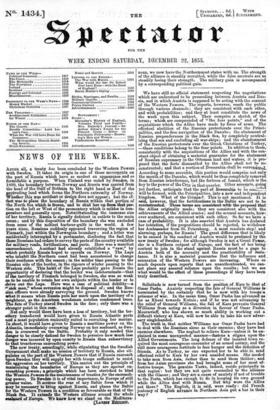NEWS OF THE WEEK.
An= all, a treaty has been concluded by the Western Powers with Sweden. It takes its origin in one of those moyemente on
the part of Russia which have so modest an appeeeenee and so formidable a purpose. When Finland was oeded by Sweden, in 1809, the boundary between Norway and Russia was cerried from
the head of the Gulf of Bothnia to 'the right hand oe East of the protruding land which forms the Northern extremity of Norway. Ilrbether this was accident or design does not appear but the ef-
loot was to place the boundary of Russia within that portion of
'the North Sea which is frozen, and to shut her up from that por- tion on the left or West of the promontory which is milder in tern- ceratiare and generally open. Notwithstanding the immense size of her territory, Russia is signally deficient in outlets to the main ocean ; and by this disposition of the boundary she was excluded from sonic of the noblest harbour-gulfs in the world. A few years since, Russians suddenly appeared traversing the region of Finmark, just within the Norwegian boundary ; and a letter was accidentally intercepted by a postmaster, disclosing the fact that these Russians had orders to survey the parts of the country available for military roads, fortifications, and ports. Here was a manifest encroachment. Accident had already established a "raw," by which probably Russia hoped to operate on Norway. The Laps who inhabit the Northern coast had been accustomed to change their residence with the season ; in the milder time passing to the Russian side of the border, in the rigours of winter passing to the Western side. This habit of the Laps probably gave Russia the opportunity of declaring that the border was indeterminate—that if the territory of Finmark belonged to Sweden, she was so weak as to be unable to retain her own subjects within the border or to ,drive out the Laps. Here was a case of political debility—a " sick man," whose reversion might be disposed of; and the Rus- sian officers were already surveying the ground. Sweden knows what it means when Russia puts her mark upon the territory of a neighbour, as the American woodsman notches condemned trees. The fate of Turkey stared Sweden in the face ; only there was a stronger point in this case.
Not only would there have been a loss of territory, but the ter- eitory transferred would have given to Russia Atlantic ports and a coast population eminently suited to recruiting her marine. In short, it would have given to Russia a maritime power on the Atlantic, immediately overawing Norway on her seaboard, as Swe- den is overawed on the Baltic. Probably it only needed this danger to be clearly defined for Sweden to perceive how much less danger was incurred by open enmity to Russia than subserviency to that treacherous encroaching power.
The new treaty, accordingly, while stipulating that the Swedish Government shall make no cession of territory to Russia, also sti- pulates on the part of the 'Western Powers that if Russia encroach upon Sweden they will supply her with troops sufficient to resist the aggression on her territory. This carries out the principle of maintaining the boundaries of Europe as they are against en- croaching powers ; a principle which has been stretched to bind the Western Powers to the maintenance of treaties for the encroach- ing power. To Sweden it is of vital importance, to Europe of still greater value. It secures the rear of any Baltic force which it may be necessary to bring against Russia, and places the Baltic for the Western Powers in a condition as favourable as that of the Black Sea. It extends the Western alliance around the whole sealmard of Europe. We know how we stand on the Mediterra-
nean, we now have the Northernmost states with us. The strength of the affiance is steadily recruited, while the false neutrals are as steadily losing their strength. The military gain is accompanied by a corresponding political gain.


































